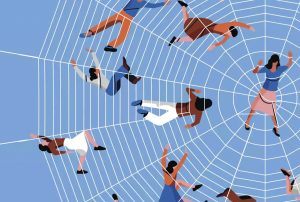Charlotte Higgins in The Guardian:
 On 7 January this year, the alt-right insurgent Steve Bannon turned on his TV in Washington DC to watch the Golden Globes. The mood of the event was sombre. It was the immediate aftermath of multiple accusations of rape and sexual assault against film producer Harvey Weinstein, which he has denied. The women, whose outfits would normally have been elaborate and the subject of frantic scrutiny, wore plain and sober black. In the course of a passionate speech, Oprah Winfrey told the audience that “brutally powerful men” had “broken” something in the culture. These men had caused women to suffer: not only actors, but domestic workers, factory workers, agricultural workers, athletes, soldiers and academics. The fight against this broken culture, she said, transcended “geography, race, religion, politics and workplace”.
On 7 January this year, the alt-right insurgent Steve Bannon turned on his TV in Washington DC to watch the Golden Globes. The mood of the event was sombre. It was the immediate aftermath of multiple accusations of rape and sexual assault against film producer Harvey Weinstein, which he has denied. The women, whose outfits would normally have been elaborate and the subject of frantic scrutiny, wore plain and sober black. In the course of a passionate speech, Oprah Winfrey told the audience that “brutally powerful men” had “broken” something in the culture. These men had caused women to suffer: not only actors, but domestic workers, factory workers, agricultural workers, athletes, soldiers and academics. The fight against this broken culture, she said, transcended “geography, race, religion, politics and workplace”.
Bannon, Donald Trump’s former chief strategist, was one of 20 million Americans watching. In his view, the scene before him augured the beginning of a revolution “even more powerful than populism”, according to his biographer Joshua Green. “It’s deeper. It’s primal. It’s elemental. The long black dresses and all that – this is the Puritans. It’s anti-patriarchy,” Bannon declared. “If you rolled out a guillotine, they’d chop off every set of balls in the room … Women are gonna take charge of society. And they couldn’t juxtapose a better villain than Trump. He is the patriarch.” He concluded: “The anti-patriarchy movement is going to undo 10,000 years of recorded history.”
Until very recently, “patriarchy” was not something rightwing men were even supposed to believe in, let alone dilate upon with such apocalyptic relish. It was the sort of word that, if uttered without irony, marked out the speaker as a very particular type of person – an iron-spined feminist of the old school, or the kind of ossified leftist who complained bitterly about the evils of capitalism. Even feminist theorists had left it behind.
Nevertheless, “patriarchy” has, in the past year or so, bloomed in common parlance and popular culture.
More here.
